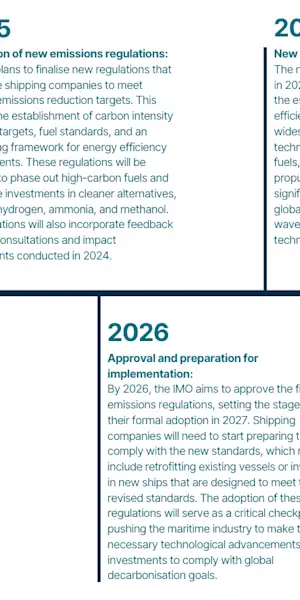Navigating regulations for a more sustainable maritime future

As the maritime industry seeks to align with global sustainability targets, EU regulations such as FuelEU Maritime and the EU Emissions Trading System (ETS) are catalysing significant changes in operational and technological strategies. These regulatory frameworks are drivers that encourage the industry to innovate and operate more sustainably.
EU regulations setting the course for decarbonisation
The path to a climate-neutral EU by 2050 is paved with ambitious policies. The European Green Deal sets the overarching agenda, aiming to transform the EU into a modern, resource-efficient economy. Within this framework, the maritime sector faces specific challenges and opportunities under the Fit for 55 package, which targets a 55% reduction in greenhouse gas emissions from 1990 levels by 2030.
FuelEU Maritime extends this directive specifically to maritime transport, mandating a progressive reduction in the carbon intensity of energy used by ships operating in European waters. Meanwhile, the inclusion of the shipping in the EU’s ETS requires operators to account for their emissions, purchase allowances, or face penalties. This system not only incentivises the reduction of emissions but also spurs the adoption of cleaner technologies and fuels.

Ensuring enforcement and global alignment
The EU implements rigorous monitoring and enforcement mechanisms to ensure adherence to its maritime regulations. This oversight extends to supporting infrastructural developments in ports, which are crucial for the provisioning of alternative fuels like LNG, hydrogen, and ammonia, setting a precedent for future global standards.
Looking forward, the industry must prepare for stricter enforcement and broader inclusion of alternative fuels in regulatory frameworks. The ongoing developments in EU policy, while serving as models for other regions, underscore the necessity for global alignment in maritime decarbonisation efforts. National leadership plays a crucial role in shaping these impactful regulatory standards, emphasising the importance of a coordinated approach.
Ambitious targets shaping a sustainable maritime future with the IMO GHG Strategy
2030: 20-30% reduction in GHG intensity.
2040: 70-80% reduction in GHG emissions.
2050: Achieve net-zero emissions.

The IMO’s regulatory leadership and the impact of MEPC 83
As the central authority for global maritime regulation, the IMO ensures that standards are consistently applied across international waters, driving alignment and encouraging the adoption of progressive practices.The pending IMO MEPC 83 meeting in April, with expected outcomes for 2025, is anticipated to deliver significant impact by advancing global decarbonisation strategies. Key decisions are expected to include the adoption of stricter carbon intensity reduction measures, the establishment of a global marine fuel standard to regulate the phased reduction of fuel GHG intensity, promoting the use of low- and zero-carbon fuels such as methanol and ammonia, and progress on implementing a maritime GHG emissions pricing mechanism, potentially including market-based measures like carbon pricing. These outcomes will reinforce regulatory cohesion and provide a unified framework for the maritime industry to align with long-term sustainability goals.
The IMO’s ability to translate ambitious climate goals into practical, binding regulations is a monumental task. Balancing urgency with the industry’s capabilities and addressing the complexities of global enforcement are crucial to the success of its long-term decarbonisation strategy.
Regulations are making maritime operations more complex, requiring companies to integrate stricter compliance measures into daily operations. While this presents challenges, it is also redefining how businesses operate — driving greater transparency, accountability, and environmental responsibility. Embracing regulation as a catalyst for innovation ensures businesses remain competitive and resilient in a rapidly evolving landscape.
Download Navigating the future: Trends shaping maritime’s green transformation for comprehensive insights into how these transformative forces can help navigate a sustainable and profitable path forward in the maritime industry.